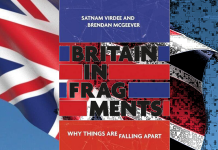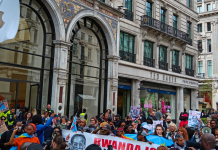Kat Burdon-Manley lays out how the current government’s failures around the Mediterranean migrant crisis links to immigration policy at home

In the first half of 2015 an unprecedented number of people were killed on the Mediterranean by decisions of our governments. The UK is complicit in the murders of approximately 1750 people travelling from north Africa to Europe to seek safety from war, famine and poverty. The coalition government was party to talks in Europe that led to the decision to pull ‘search and rescue’ operations on the Mediterranean. These meant phasing out Italian ‘search and rescue’ operations known as ‘Mare Nostrum’, to be replaced with ‘Triton’, a border protection operation, run by the EU agency Frontex.
Mare Nostrum carried out proactive search and rescue of 27 thousand square miles of the Mediterranean; Triton only operates border surveillance within 30 miles of the Italian coast, on a budget of less than a third of the Italian operation. Mare Nostrum has saved over 150 thousand lives on the Mediterranean to date. This still failed to rescue over 3000 people who died crossing the Mediterranean in 2014. The government was warned that the removal of search and rescue would lead to more deaths of those crossing the border into Europe to seek safety and sanctuary. This was a deliberate attempt by governments across Europe to push back migrants.
British government complicity
The Home Secretary Theresa May was on the EU Justice and Home Affairs Council when these decisions were made. She was well aware of the dangers. Frontex admitted they expected more deaths at sea, and the General Secretary of the European Council for Refugees said the numbers of people dying would multiply. The immigration minister James Brokenshire defended the position at the time, arguing that search and rescue operations encouraged migrants to make the dangerous journey across the Mediterranean. We should be in no doubt: EU policy is to drown migrants as a means of border control.
On 15 April this year over 400 migrants drowned at sea as their boat capsized, on 18 April a boat containing over 900 people capsized, resulting in the largest loss of life in a single crossing. EU leaders are now advocating targeting people traffickers, which will lead to border crossings being uprooted and moved to other areas. There are hundreds of thousands of migrants across the northern African coastline, waiting to make the journey to Europe. Famine, poverty, war and persecution are not going to stop because we target people traffickers.
Building more walls will not help either; when the border fence was erected between Turkey and Greece, many, predominantly Syrian refugees, took more dangerous routes by sea. The UK has an appalling record on relocating Syrian refugees having only proactively relocated 143 Syrians; millions of Syrian refugees are living in refugee camps in Turkey, Lebanon, Iraq and Jordan. Thousands have had to make their own way to Europe, rather than face the prospect of living in refugee camps indefinitely.
Immigration in the run-up to the elections
At the same time, in the run up to the elections, the main parties pushed an anti-immigrant agenda. Very few mainstream parties, with the notable exception of the Green Party, offered an alternative. Labour certainly didn’t, even releasing anti‑immigration merchandise such as their infamous ‘immigration controls’ mug.
As the main parties pander to the idea that migrants are to blame for the lack of job prospects and the cost of NHS care, the government is getting away with murder through their policies. People across the UK are being sanctioned by this government, and forced off benefits into dire poverty for the most minor infringements of the arbitrary benefit rules. Refugees who are entitled to benefits are very often sanctioned because of language barriers and difficulties understanding the complexity of the rules.
Anti-immigration policy
The government is implementing anti-immigration policies, such as the Immigration Act 2014, which charges migrant workers and students for NHS care.
Previously, all people living in the UK with no minimum time period were able to access free NHS services. These are the people keeping the NHS going: over 30% of healthcare workers employed by the NHS are migrant workers and international students already pay higher university fees to study in the UK. What the new legislation does is change the definition of ‘ordinary residence’, to only include those who have indefinite leave to remain.
Refugees and asylum seekers are exempt from paying the health surcharge, but the position is unclear for failed asylum seekers, those who are either appealing a decision of the immigration tribunal or are in the process of returning to the country they claimed asylum from, or those who are destitute, and irregular migrants like those who have breached a condition of entry. It is likely that with the improved data flows between the Department of Health and the Home Office, failed asylum seekers, irregular migrants and people with uncertain immigration status will be deterred from accessing vital emergency NHS treatment.
The Department of Health has issued guidelines to hospitals, outlining their legal obligation to identify those not entitled to free NHS treatment. Healthcare professionals now double up as border control officers, and will be obliged to deny vital healthcare to those who need it. Groups, such as Docs not Cops are campaigning to reverse the damaging provisions in the Immigration Act, stating:
The NHS has always given free health care to UK residents. Its founding principles were healthcare free for all, regardless of ability to pay. This was a universal right, which applied to all who lived in Britain.
Domestic migrant workers
Women make up the overwhelming majority of the domestic migrant workforce. ‘Tied visas’ mean that employees entering the UK with their employers, to carry out domestic work such as cooking, looking after children and cleaning, will lose their immigration status if they leave their employer. The Modern Slavery Bill, which is currently going through Parliament, does not contain provisions for domestic migrant workers to move from one job to another freely; this creates a power dynamic between employer and employee, which can and has led to abuse.
The number of domestic migrant workers being physically abused by their employers has gone up from 8% to 16%, there has also been a drastic increase in the number of employees reporting that they are not allowed to leave the house unsupervised, from 43% to 71%, the percentage who do not have their own bedroom has risen from 34% to 65%, those who are forced to work over 16 hours a day has risen from 32% to 53%. Domestic migrant workers rely on their employers for their housing and immigration status. When these women leave their employers they are in breach of immigration rules. They have no means to support themselves outside of their employers home, and accessing legal representation to bring cases against employers for breaching UK employment law rules, is made all the more difficult as a result of changes to legal aid. So it is no surprise that unscrupulous employers have taken advantage of a system of slavery, which has become institutionalised and sanctioned by the government.
Detention centres
Furthermore, the UK is the only place in Europe that does not have a time limit on imprisoning people in immigration detention centres. People are detained, with little or no access to the outside world in prisons run by private companies such as G4S and Serco. There has been no investigation into the widespread sexual abuse of women by the mainly male staff at Yarl’s Wood Immigration Removal Centre. The UN violence against women expert, Rashida Manjoo, was refused entry into Yarl’s Wood as part of an investigation into violence against women; she has since criticised this decision.
The abuse of migrant women is no accident; women are abused in detention, yet this has not been investigated; women domestic migrant workers are forced to work under abusive conditions, which has become institutionalised by a government complicit in the sexual and violent abuse of migrants.
If that wasn’t enough, we now expect our doctors, teachers, university staff and landlords to act as border control officers as we extend our borders beyond the geographical, to our very streets and public services.
These policies are implemented in the full knowledge that people will die as a result. Our government and the leaders of Europe are responsible. Opening up routes of safe passage is a feasible solution to the worsening refugee crisis, and an important demand. Otherwise we will continue to see deaths at our borders.
Originally published in the Summer 2015 issue of the rs21 magazine.




















[…] First published at the rs21 website. […]